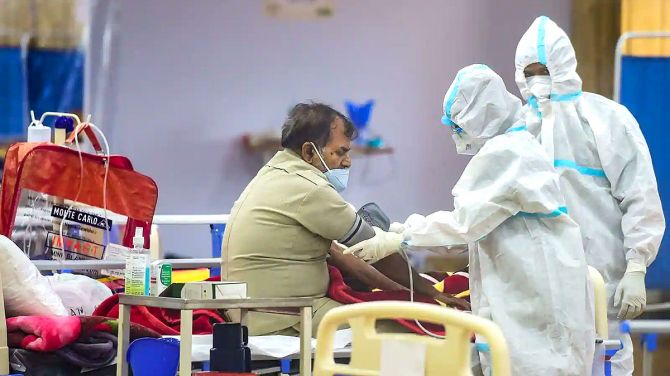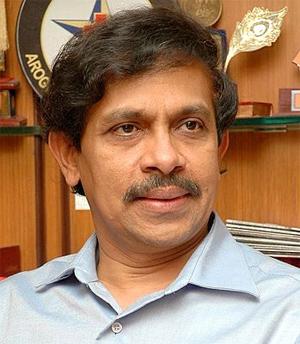“If India truly wants to be a superpower,” Dr Abhijit Vaidya tells Kangana Pandiya, “48 per cent of our people cannot be malnourished. We need to ensure health for all.”

The pandemic has challenged the Indian healthcare system like never before. It could not cope with the unusually heavy demand for medical assistance as a result of which several people lost their lives.
There has also been immense pressure on healthcare workers to continue fighting the pandemic, even as the resources at their disposal have dwindled.
In a landmark judgement in 1983, the Supreme Court held that the right to health was included in the fundamental right to life.
During the pandemic, however, people were seen struggling for medicine, oxygen, hospital beds, food supplies and even a place to cremate loved ones.
Unfortunately, healthcare continues to be a luxury for the common man.
What are the issues with our healthcare system? What can be done to make it accessible and affordable?
Kangana Pandiya, a second year MBA student at IIM-Ahmedabad, posed these questions to well-known cardiologist, Dr Abhijit Vaidya.
Dr Vaidya, who has 31 years of experience in cardiology, practises at the Sanjeevani Cardiac Care Centre in Sadashiv Peth, Pune.
He is a life member at the Cardiology Society of India, Hypertension Society of India, College of Interventional Cardiology of India and the Indian Academy of Echocardiography.
He has completed his MBBS, MD in medicine and his post-graduate training in cardiology from Israel. He is a visiting fellow at the Thomas Jefferson University Hospital in the US.
Dr Vaidya has devoted several decades to making healthcare affordable in India.
His path-breaking work in this direction includes the Arogya Sena that he has founded. The Sena comprises 14,000 volunteers, all of whom are trained personally by him in many modules including disaster management and public health.
The Arogya Sena acts as a first responder in emergency situations.
After the devastating 2015 earthquake rocked Nepal, Dr Vaidya and the Sena rushed to help. They provided the survivors with food and medicine and held several camps to check that their blood pressure and breathing was normal.
Dr Vaidya has also worked in remote places in Jammu and Kashmir, administering healthcare after calamities occurred.
When the pandemic struck, several people were in dire need of oxygen cylinders at home and lacked the facility to transport them.
Dr Vaidya gathered over 100 auto drivers and had them install oxygen cylinders and basic healthcare facilities in their autos. These autos then served as mini-ambulances for the common man. Their service was available 24 x 7.
He ran two toll-free numbers where the COVID-afflicted and their families could contact the Sena for help with medicine and hospitalisation.
 IMAGE: Dr Abhijit Vaidya. Photograph: Kind courtesy Dr Abhijit Vaidya
IMAGE: Dr Abhijit Vaidya. Photograph: Kind courtesy Dr Abhijit VaidyaDr Abhijit Vaidya has also started several pharmacy stores, where medicines are provided at highly subsidised rates. He does this so that the poor are not denied basic healthcare due to their lack of purchasing power.
He points out certain problems with the healthcare system in India.
Budget allocation
The allocation to public health is a mere 1.8 per cent of GDP.
This needs to be raised to at least 5 per cent for the common man to gain access to basic health amenities.
Accessibility
Basic medicines and procedures need to become more accessible to all.
In several of the villages he toured as a part of his padyatra years ago, he found that the villagers were unaware of where to get medicine or any surgical procedures that needed to be done.
It has also been very difficult to get doctors to practise in these areas, leading to several villages being monopolised by quacks when it comes to healthcare.
Information asymmetry
Slum dwellers are often not aware of basic practices to sustain a healthier lifestyle.
Due to this lack of awareness and the lack of facilities, several people die from diseases that are easy to prevent and cure.
Affordability
Several medicines and tests are priced exorbitantly. Even in government hospitals, the patient must be below the poverty line to avail the services for free.
However, the poverty line is defined in a very restrictive manner. This means that several people who are living in poverty do not qualify for these services.
Medicine should be a basic right, affordable for all.
Availability
Our current healthcare system is capitalistic in nature. Those with the highest buying power can hoard medicines and oxygen cylinders, while those who are susceptible to the disease but have low buying power are often left to suffer and die.
These issues are fundamental to the way the current healthcare system is organised.
The manner in which death and disease afflict the poor is rarely discussed by the wealthy and powerful.
Dr Vaidya also speaks about changes that must happen to allow for an improved healthcare system for all.
Redefine the poverty line
He has held protests demanding that the poverty line be changed so that the poor can gain access to free healthcare services.
Challenge waste disposal practices
Rivers are often polluted by factories.
This destroys the water source for vulnerable citizens and causes health disasters.
Such practices must be called out and prevented at all costs.
Stop food adulteration
Using pesticides, colour and injecting chemicals to make food last longer have all adversely affected consumers.
Large companies undertake unethical practices to increase profits.
Regular checks on the quality of food provided to the poor must be held.
Primary healthcare centres, clinics and nurses
The resources we allocate to healthcare are far fewer than what is required.
Healthcare spending needs to rise manifold.
A hospital in each taluka
There are operations that cannot be undertaken in small clinics.
We need hospitals at an accessible distance for all.
Super-specialty hospitals (with all facilities) need to be there in all cities and not just major metros.
An activist at heart, Dr Vaidya has never hesitated to take to the streets to demand better health services and amenities.
“If India truly wants to be a superpower,” he says, “48 per cent of our people cannot be malnourished. We need to ensure health for all.”












 © 2025
© 2025